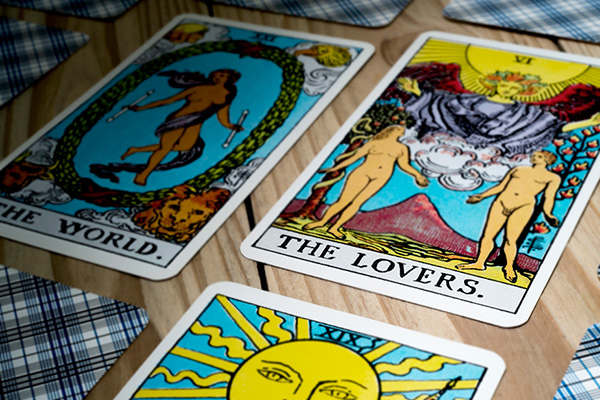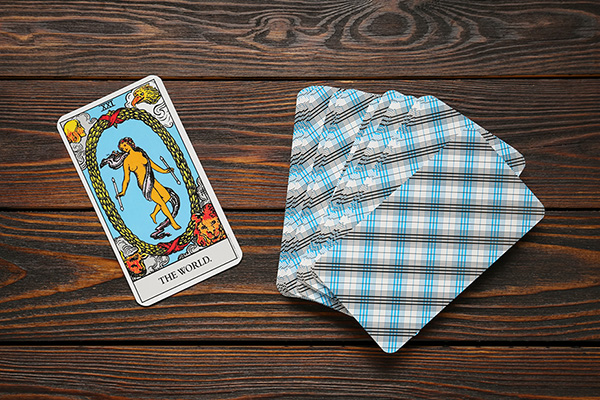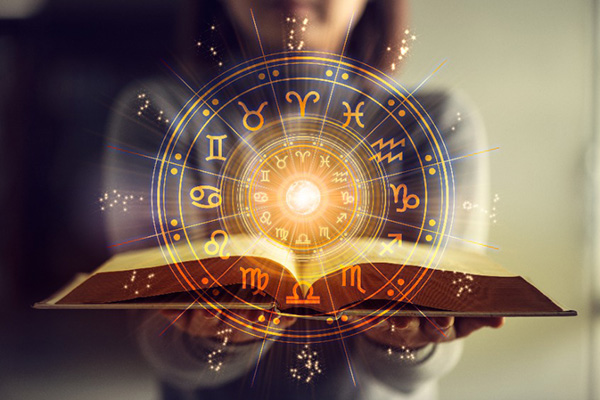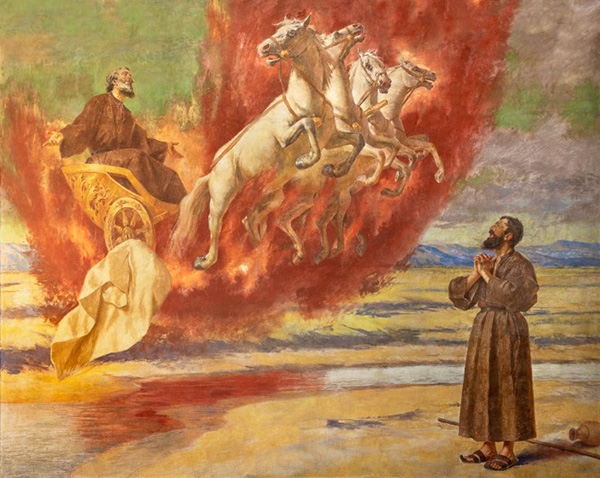bible
The Mystical Tale Of The Lovers Card
 I have made an illuminating discovery regarding the Lovers card in the Tarot. In all the years I have been practicing cartomancy, I never realized certain aspects of this card’s mytsical symbolism and its portrayal of the healing power of divine love.
I have made an illuminating discovery regarding the Lovers card in the Tarot. In all the years I have been practicing cartomancy, I never realized certain aspects of this card’s mytsical symbolism and its portrayal of the healing power of divine love.
In the classic Rider-Waite rendition, it is commonly accepted the card merely depicts an archetypal Adam and Eve in the Garden of Eden, with a scheming serpent lurking behind Eve and the majestic figure of an angel looming overhead. Recently, I learned from a psychic colleague’s podcast that the angelic figure portrayed in the in card in fact represents the Archangel Raphael. I’ve always been fascinated by Raphael, the angelic healer of minds, bodies and souls.
Raphael is first mentioned the ancient Hebrew apocalyptic book of Enoch, as well as the deuterocanonical book of Tobit. Also known as the apocrypha, the deuterocanonical books are not traditionally included in Protestant and Jewish canonical texts, but it is recognized in the Roman Catholic and Orthodox traditions.
The book of Tobit relays the story of a blind man named Tobit and his son Tobias, whom he sends to retrieve an investment of silver he had deposited in a town in Media in north-western Iran. With the protection and guidance of the angel Raphael, Tobias arrives along his journey in Ecbatana, the capitol of Media, where he meets a young woman named Sarah.
Sarah is in utter despair and praying for death, as she has already lost seven husbands. Each of her lovers had been murdered on their wedding night by the demon Asmodeus, who is obsessively in love with her. Angel Raphael encourages Tobias to marry Sarah and then helps him to defeat the homicidal demon.
The Empowering Symbolism Of The World Card
 The World card in the Tarot remains one of my firm favorites. I am all for personal and spiritual growth, the completion of cycles, and new beginnings. The World represents exactly that: the ending of a cycle and pause in life, before the next major cycle begins with the fool.
The World card in the Tarot remains one of my firm favorites. I am all for personal and spiritual growth, the completion of cycles, and new beginnings. The World represents exactly that: the ending of a cycle and pause in life, before the next major cycle begins with the fool.
The journey from the new beginnings of The Fool to the fulfilling endings of The World is a constant evolutionary process in our everyday lives that is represented by the sequence of the 22 Major Arcana cards of the Tarot. The World is the 22nd trump and therefore final card of the Major Arcana.
I have reflected on the imagery of the Rider-Waite version of this Tarot card in great detail. Rider-Waite is probably the most popular and universally recognized Tarot deck. The illustrations by Pamela Colman Smith at first glance appear simple, but the details and backgrounds feature abundant mystical symbolism.
The World pictures an empowered figure within a wreath – traditionally a symbol of victory, success, achievement, and eternal life. The figure holds a wand in each hand, which is reminiscent of the Magician card and the Two of Wands. However, while The Magician holds only one wand, the two wands in the The World card represents fulfillment, wholeness, balance and coming full circle.
The card is framed by four animals on the diagonal. The depiction of these four creatures parallels the four animal symbols used in Christian art to represent the four Evangelists, namely Matthew, Mark, Luke, and John. The four animals also represent the zodiac signs of Taurus, Leo, Scorpio, and Aquarius, the four fixed signs in Western Astrology, which in turn represent the classical four elements of Earth, Fire, Water and Air.
A Brief History Of Astrology
 The energies of the planets and stars affect us on many levels every day, whether we were aware of it or not. The earliest humans looked especially to the movements and phases of the Sun and Moon to guide them in their decisions about when to hunt, when to plant and harvest, and when to prepare for winter or migrate.
The energies of the planets and stars affect us on many levels every day, whether we were aware of it or not. The earliest humans looked especially to the movements and phases of the Sun and Moon to guide them in their decisions about when to hunt, when to plant and harvest, and when to prepare for winter or migrate.
From this evolved the practice and study of Astrology. The early civilizations of Mesopotamia were the first to observe the patterns formed by stars in the galaxy as long ago as 3000 BC, while Indian astrology began to emerge as far back as 1200 BC.
The original astrologers identified five ‘wandering stars,’ which together with the sun and moon became the seven original ‘planets.’ More planets were of course identified over time, as technology advanced to introduce the telescope and other astronomical devises.
The Babylonians are generally credited for first developing formal Astrology, because they developed astrological charts to predict the recurrence of the seasons and certain celestial events. Centuries later, Ancient Egypt and Greece discovered Babylonian Astrology, where it soon became highly regarded as a science and was eventually also embraced by the Romans, as well as in the Middle East. In time, its popularity spread throughout the rest of the world. Today, we still use the Roman names for the zodiac signs.
Meanwhile, separate systems of Astrology also emerged in India, China, and Mesoamerica. It remains unclear whether the Babylonian, Indian (known today as Hindu or Vedic Astrology) and Chinese systems of Astrology evolved in isolation and independently, or whether they mutually influenced each other. There are many similarities between these systems, but also many distinct differences. Scholars have been studying and debating this for centuries, but the matter remains inconclusive.
Divine Love Abides All
 When we have love in our life we can keep negative entities away from us on the lower realms, as well as on the earthly walking realm. There are both malicious people and malevolent non-physical beings in this world. Divine Love protects us from their evil.
When we have love in our life we can keep negative entities away from us on the lower realms, as well as on the earthly walking realm. There are both malicious people and malevolent non-physical beings in this world. Divine Love protects us from their evil.
When we live our life with unconditional love in our hearts, and keep a calm mind and spirit, we are easily read by others as being very kind loving people – it shows on our faces. You sometimes can’t tell on some people’s faces if they are good or evil, because Satan, or the Evil One, is tricky and manipulative. The Bible tells us that Lucifer was a beautiful angel in the beginning, before he fell and became corrupt.
It is so important to live with the Divine Spark inside of us and be mindful of what we put into our bodies, as I’ve seen energy shift and people’s faces shift when they open the door to negativity and evil influences in their lives. Some are more susceptible than others. For example, people who abuse alcohol allow really low spiritual entities into their lives, to seek and ruin and destroy anything good that they have going on – especially by way of relationships. Some people should just stay far away from alcohol, as they become very aggressive and belligerent, and just not themselves when they drink. I have seen people ruin their lives because of alcohol.
Anything that can deter you from Divine Love is not of the Light. Everything is best in moderation. But for some the negative energy keeps them wanting more as the negative entities around them wants them to fail, so that they themselves can grow stronger while their victim’s life slowly goes in a downward spiral. In some cases, their addictions make them so depressed they even take their own life, and it hinders their soul from achieving soul growth in this current incarnation they are in.
There Is Nothing To Worry About!
 We seem to live in troubled times. In my part of the world, we have recently experienced the passing of our beloved queen, the resignation of two prime ministers, and the continuing effects of a global economic recession. So much to worry about, right?
We seem to live in troubled times. In my part of the world, we have recently experienced the passing of our beloved queen, the resignation of two prime ministers, and the continuing effects of a global economic recession. So much to worry about, right?
True, but only from a limited human viewpoint. From the spiritual perspective, we need not worry about what tomorrow may bring, because we can trust in God, Source, Spirit, the Divine to support and guide us, and to positively orchestrate things on our behalf.
As a Christian, I have faith in the Almighty having my back every step of the way. In the New Testament of The Bible, Jesus Christ makes it very clear why we should not worry about what lies ahead. In Matthew 6 he says:
“Look at the birds of the air; they do not sow or reap or store away in barns, and yet your heavenly Father feeds them. Are you not much more valuable than they? Can any one of you by worrying add a single hour to your life? And why do you worry about clothes? See how the flowers of the field grow. They do not labor or spin…Therefore do not worry about tomorrow, for tomorrow will worry about itself. Each day has enough trouble of its own.”
As a professional psychic, many clients consult me because they are fearful or anxious about what will or will not happen in their future. Worrying about the future is of course understandable, yet there are both spiritual and practical reasons why it is best not to do so:
Faith Holds Strong When Trouble’s Near
 When we experience the loss of a loved one, or grief of some kind, faith is the one thing that helps us stay grounded and keep our sense of purpose.
When we experience the loss of a loved one, or grief of some kind, faith is the one thing that helps us stay grounded and keep our sense of purpose.
When one door closes another one truly does open. Sometimes it’s the birth of a baby, or the beginning of a new relationship, or simply a new venture, discovery, or opportunity. Whatever it is, faith will give us what we need to keep ‘plucking along’.
Faith enables us to find new things, to give us something to look forward to. It also offers us the opportunity to give back and contribute towards making humanity and our world a better place.
To just do nothing is a complete waste of time and we are merely taking up space for no reason. So, we must keep going, even though things may seem to be at a standstill. You may be going through depression or whatever it may be, but it could also be a golden opportunity.
Often, when there is a family crisis, for example, emotions get charged and people sometimes will say things they later regret. Angry people too often take unnecessary risks, instead of waiting until the storm is over.
My advice is to not waste time and energy on arguments or disagreements. Just hold on to your point of view and add a dash of patience. Try to always be in complete control of your emotions and see things as they really are.
Prophets, Or Time Travelers?
 Could some of the famous prophets, such as Nostradamus, or the prophets of the King James Version of the Bible, or the prophet Mohammad, actually have been time travelers?
Could some of the famous prophets, such as Nostradamus, or the prophets of the King James Version of the Bible, or the prophet Mohammad, actually have been time travelers?
And is it merely coincidence that the Oracle of Delphi used a brass seat for visions of the future? As did Nostradamus, the 16th Century French poet and visionary. Nostradamus writes, “I will be seated at night, in my secret study. Alone sitting upon a stool of brass, a flame shall leap forth from the solitude, granting that which is not to be believed in vain.”
And, in the 1895 HG Wells fiction novel, The Time Machine, the protagonist of the story uses a black and polished brass time machine to gain mechanical control over time. Is there something about sitting on brass that allows one to see into the future? Or, could they possibly be talking about a brass seat on a sort of vehicle?
There is a mystic figure called Khidr in Islamic exegesis. Khidr is said to have met Islamic figures and prophets at different times and places. It is difficult for scholars to understand how that could be – unless Khidr was a time traveler or an immortal being. Khidr was said to have met with Moses, Abu Zur’a al-Razi and Elijah. It is also believed that Elijah and Khidr may be the same person.
The scriptures say that Elijah did not die that he ascended into heaven (time travel) and would return as one of the two witnesses of the Great Tribulation period that would precede the Second Coming of Christ.
Enoch, from the Biblical scriptures is said to have taken many trips to heaven to meet the pre-existent Son of Man, whom Enoch prophesied would judge the souls of all men. Is this too, another instance of time travel? Interestingly, the book of Enoch was omitted from the King James Version of the Bible.
In several instances of supposed time travel a “storm” or a “ball of fire” or even a “chariot of fire” is mentioned. As in the book of Ezekiel, when he has a vision of the future, he mentions a whirl wind coming out of the north, a great cloud with raging fire, engulfing itself – this being the first of the prophet’s visions.